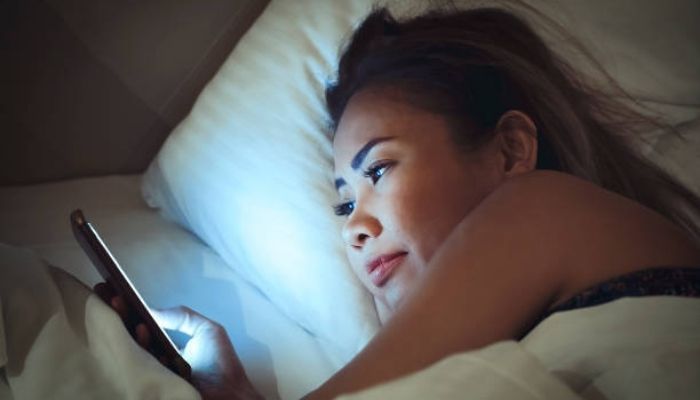If you’ve been regularly struggling with insomnia or a less-than-restful sleep, then you’re probably already aware that blue lights from screens can affect sleep. You might be wondering what other ways blue light hurts your sleep.
Pretty much everything! It’s the “easy access” to blue light in the evening hours that contributes most to your overall circadian misalignment. Some tips for combating this include using ND filters on your devices and covering screens with darkness when they aren’t in use.
What is blue light?
Blue light can be artificially created by a number of different devices, including computer screens and cell phones . These devices also emit other colors of light mainly red and amber which are also able to affect sleep. Understanding this difference is important if you want to sleep well at night, and avoid getting busted by your eye doctor! And why not check out our guide on how to protect your eyes?
Blue light is a problem for sleep because it disrupts the natural circadian rhythm during the evening hours. It does this by making it harder for us to enter REM sleep and thus preventing us from getting a healthy, 7-8 hours of sleep.
What is blue light doing?
Blue light is a major contributor to the rise in health concerns related to poor sleep hygiene . Sleep hygiene refers to most of what you do throughout the day which affects your ability to get a good night’s sleep. For example, we use blue light at night, so it has an impact on our ability to fall asleep .
As a result, blue light has made waves in the area of sleep. Blue light is known to disrupt our natural circadian rhythm and help us stay awake later in the evening, even when we have a need to sleep. It’s especially harmful to young children, who spend a large majority of their time sleeping at night and therefore have more exposure to screens.
Blue light is being studied for its effects on humans as it relates to sleep and so far, there’s no evidence that it helps us feel more alert or can reduce jet lag . There are plenty of other factors involved with jet lag which impact your ability to fall asleep and stay asleep at night (like temperature). But blue light has been known to affect your body’s natural circadian rhythm.
What are the sources of blue light?
Blue light can be created by a number of different sources, including computer screens and TVs which use LED technology that creates high-intensity blue light. And it’s this very intensity that can be harmful to sleep, because it prevents our body from entering into regular sleep cycles . That includes REM sleep which is when we have our dreams and when we get most of our restful, deep sleep.
We’ve already seen how blue light can cause us to feel more tired at night but there’s even more evidence that it affects our sleep health. Specifically, exposure to blue light has been linked to a disruption in our eyes which makes it harder for us to fall asleep and stay asleep throughout the night . Disrupting our sleep cycles. Blue light has also been known to cause us to experience disruptive “sleep disturbances”. These disruptions may include: Nightmares Disturbed sleep Has trouble falling asleep Waking up too early Not feeling refreshed upon waking Slowed reaction times and confusion Difficulty concentrating
Effects on circadian rhythm
Your circadian rhythm is what affects your day-to-day physiology. This operates on a 24-hour cycle that determines when you wake, start to feel alert, become sleepy and go to sleep at night. Light and dark are the signals that tell our body about these patterns and in order for us to be healthy and alert, we need to maintain this pattern. On top of this, our body clock also needs to be in sync with the outside world.
In addition to this, it’s important to make sure our circadian rhythm is in tune with the time of day that we feel best. Specific health problems may be linked to an unhealthy circadian rhythm like insomnia, depression and even cancer. And according to recent studies , chronic exposure to blue light in the evening hours of the day could be one of these contributing factors.
How do we protect ourselves from blue light?
Our eyes are designed to be sensitive to the amount of blue light that they are exposed to at any given time and will adjust accordingly. But if we’re exposed to too much blue light, our eyes can’t adjust as fast as they used to (which may contribute to the development of eye problems). That’s why it’s important to protect your eyes. You can choose to avoid blue light exposure when you’re:
At home . During the evening, keep TVs and computers out of your bedroom and avoid using them in the hour before you go to bed. This will help your body feel less tired during nighttime hours.
In addition to avoiding blue light from computers in the hour before bed, consider using f.lux (for computers), Iris (for smartphones), or Ultraviolet Glasses. These tools allow you to change the amount of blue light that is emitted from your screens so they aren’t as bright at night. When you’re outdoors. You can also use melatonin supplements to sleep.
Conclusion
In addition to these recommendations, here are some additional tips for reducing blue light exposure during nighttime hours. Use dim or black-colored lighting (like warm or incandescent lights). This will help reduce the amount of blue light you’re exposed to by having a more consistent eye-level exposure.































